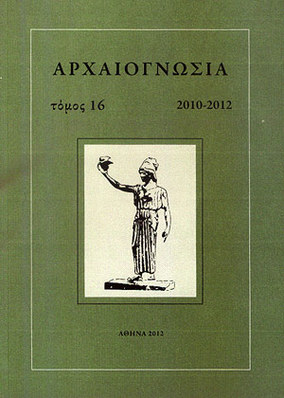Ναυσιφάνης και Επίκουρος : οι περί ρητορικής απόψεις τους
Part of : Αρχαιογνωσία ; Vol.12, No.1-2, 2003, pages 111-139
Issue:
Pages:
111-139
Parallel Title:
Nausiphanes and Epicurus : their views on rhetoric
Section Title:
Μελέτες-Articles
Author:
Abstract:
The aim of this article is twofold: we attempt to reconstruct Nausiphanes’ views concerning rhetoric and to pinpoint the influence these views had on Epicurus’ attitude towards rhetoric. Nausiphanes’ basic positions concerning rhetoric can be summarised as follows:(i) Persuasion comes from the acquaintance with natural philosophy and it is thus not a product of rhetoric.(ii) Political rhetoric is an art in itself; it has its own aims and it employs its own empirical methods to achieve them, exactly as the other arts and sciences do.(iii) The (natural) philosopher is the best orator, since he possesses the faculty of persuading and at the same time he can apply the methods of politics better than anyone else.(iv) The (natural) philosopher’s speech is the most suitable to be used in the political oratory, because it is simple, clear, and essential contrary to the orator’s stilted speech.(v) The (natural) philosopher must deal with politics and exercise political (and dicanic) oratory, since he is able to solve political problems and improve society. Epideictic rhetoric is of no interest to him.Needless to say that Epicurus' general views on rhetoric do not seem to have been formed under the influence of Nausiphanes. Epicurus disapproved of rhetoric absolutely and he also banned the philosopher from dealing with politics or other fields of rhetorical activity. However, if we move from the general to the more specific positions concerning rhetoric, then we discover strong traces of Nausiphanean influence.(i) Following Nausiphanes, Epicurus does not make a distinction between political and dicanic oratory and treats both as one and the same genre; epideictic constitutes a second, separate genre.(ii) Epicurus’ views concerning the need for simple, clear, essential speech reflect similar views of Nausiphanes.(iii) Epicurus disentangles persuasion from rhetoric, as Nausiphanes did earlier. Rhetoric cannot give its followers the ability to persuade. It is not the art of persuasion. This demystification of rhetoric, which started with Nausiphanes, continued with Epicurus and his followers, and left its traces to the history of the Epicurean philosophy (see, e.g., the dispute between Philodemus and the Epicureans on Rhodes and Kos). Epicurus, however, does nor go so far as to connect the power of persuasion with philosophy or any other art. According to him, only a persuasive power of a limited range exists which results from practice and experience, and probably from the speaker's natural endowments.(iv) Dealing with politics may create a cunning orator, through practice, exercise, and accumulation of political experience. This orator is not depicted as a good speaker who is able to persuade his audience, but rather as a good politician who is able to recognise the real interests of the city. This view echoes again Nausiphanes' similar point, which was based on his fundamental position that political rhetoric is an empirical art in itself; a position which was rather rejected by Epicurus. The latter believed that rhetoric Can be called an art only if the term 'art' is used in a broad and very loose sense.
Subject:
Subject (LC):
Keywords:
αρχαία ρητορική
Notes:
Περιέχει βιβλιογραφία




